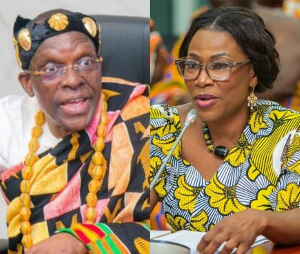Nairobi — Osibisa, the great Ghanaian band, is celebrating 40 years of musical excellence with the launch of two albums, Osee Yee and The Very Best of Osibisa.
"We've decided to come up with two albums. The Very Best of Osibisa, is a compilation of our favourites and hits from over the years.
The second, Osee Yee is interesting well-played music with great spirit and enough of the original Osibisa flavour," band leader Teddy Osei told The Hindu newspaper of India recently.
Fresh from the band's just concluded tour of India -- the first in almost three decades -- Osei told The EastAfrican that the new albums will be launched on February 27 next year at The Queen Elizabeth Hall in London.
The 14-track fourth generation album Osee Yee, performed in the Ghanaian Akan dialect and English, has songs like Osuna, Watusi, Ayioko, Yen Ara Ghana, Higher and Higher, Boyengya, Too Much Going On, Saworowa, and My Sweet Lord (a gospel song).
The musicians on the new album are Osei (on sax, flute, African drums and vocals), Mac Tontoh (flugelhorn), Colin Graham (trumpet), Alfred Kari Bannerman (lead guitar), Emmanuel Rentzos (organ, vocals), Kwame Yeboah (acoustic guitar, keyboards, drums and congas), Gregg Kofi Brown (vocals), Kofi Ayivor (congas) and Alex Kwaku-Boateng (drums), among others.
The 17-track The Very Best of Osibisa compilation, specially chosen by Osei, includes their first instrumental jazz hit, Music for Gong Gong (bestseller on the pop charts in both the UK and US in 1971).
Woyaya (1971) later covered by Art Garfunkel, Highlife-influenced party favourite Sunshine Day (1975), Dance the Body Music (1976), Coffee Song (1976), I Feel Pata Pata (performed with the late Maria Makeba), Welcome Home, Ayiko Bia, Uhuru, and Nkosi Sikeleli Africa, among other hits featured.
As to whether their fans should expect more releases, Osei said: "It's very possible, but let's see how this goes first."
Osei attributes the bands' success to a number of factors.
"We have had many new band members who have introduced their own style of playing and modern technology has definitely lent a new edge to the sound. But our music continues to remains the same -- from the West Coast of Africa," he said.
"Osibisa's music still retains the Ghanaian highlife influence. London's varied sounds have definitely touched our music, which is where its global feel comes from. Our music exists because of the rich tradition and heritage of African sounds. Osibisa put African fusion with Western music genres on the world map," Osei noted.
"...Osibisa promises music that feels traditionalist, because the core of their music comes from the heart of Africa -- from deep-toned Congo drums, pounding out cross-rhythms in an unbroken torrent, without trampling on the intricacies of global sound," The Hindu observes.
"Osibisa were true pioneers. They were the first band to successfully promote West African music genres, not just in Britain (where they are based) but to the world, and were the first African fusion band to notch up a whole series of bestselling singles and albums in the pop charts - with more international hits than any other African band has enjoyed since...," writes Robin Denselow on the sleeve notes of The Very Best of Osibisa.
At its inception in 1969, Denselow notes: "...The Osibisa mix of what they called criss-cross rhythms that explode with happiness naturally included Highlife influences..., along with jazz, rock, calypso and other West Indian styles, along with a dash of disco and unashamed pop. They were a band who could hold their own along side the rock stars of the era, supporting the Rolling Stones or Pink Floyd..."
But in the 1980s it all suddenly changed, as these pioneers of the new global music scene fell from fashion just as the "world music" movement was beginning to gather momentum, Denselow writes, adding: "The band battled with record companies who wanted them to abandon their African influences and play disco, while hardcore fans of authentic African sounds were put off by those earlier pop hits. No matter. The band kept going, and they are still going, 40 years on, with a repertoire of very different songs, and an incredible history to look back on."
Entertainment of Monday, 7 December 2009
Source: Bamuturaki Musingizi 7 December 2009












